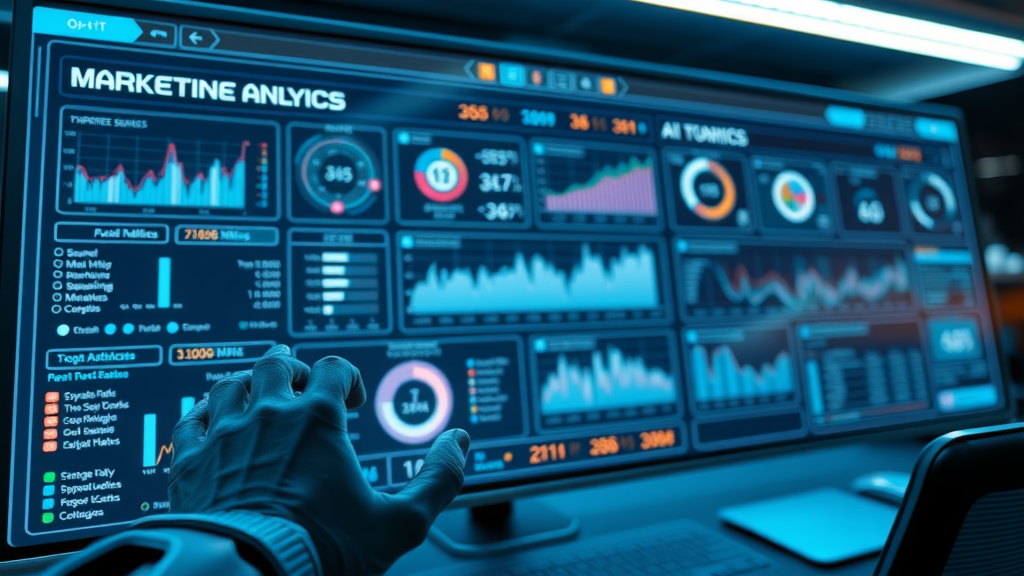What if you could double your revenue growth rate just by adopting the right technology? In today’s digital world, AI in small business marketing isn’t just hype—it’s the fastest-growing secret behind the success of ambitious small business owners. AI technology now fuels everything from email marketing to personalized social media campaigns, turning tight budgets and limited resources into powerful engines for growth. In this comprehensive guide, you’ll discover how small businesses like yours are leveraging artificial intelligence to save time , supercharge marketing tools, and create genuine connections with customers. Get ready to unlock your business’s next growth chapter.
Unveiling the Power: Why AI in Small Business Marketing Is Revolutionizing Growth
AI in small business marketing is changing the game for entrepreneurs everywhere. By leveraging AI tools, even businesses of all sizes can tap into analytics and automation once reserved for industry giants. AI solutions not only save time on repetitive tasks but enable efficient data analysis for strategic decision-making. When small business owners employ AI technology—be it for campaign optimization, customer data segmentation, or personalized media posts—they create more impactful marketing strategies that reach their target audience with laser precision.
The acceleration of growth is perhaps the most compelling reason for adopting AI in marketing efforts. According to recent industry data, businesses implementing AI-driven marketing tools not only engage better with customers but often experience measurable improvements in conversion rates and overall business growth. AI empowers small businesses to level the playing field, compete with larger rivals, and deliver exceptional customer experiences with fewer resources.

“Did you know that 84% of small businesses using AI marketing tools see faster revenue growth?” — Integrating data-backed impact with a forward-looking perspective.
What You’ll Gain from Mastering AI in Small Business Marketing
- Deep understanding of essential AI tools for small business marketing
- Step-by-step integration strategies for email marketing, social media, and content creation
- Tips to maximize ROI with minimal resources for small businesses
- Real-world examples of AI-driven marketing innovation
Understanding AI in Small Business Marketing: Core Concepts and Impact
Defining AI in the Context of Small Businesses
Artificial intelligence in small business marketing refers to software and platforms that use machine learning and advanced algorithms to automate, optimize, and personalize marketing strategies. Unlike traditional marketing tools, AI solutions analyze vast amounts of data rapidly, making it easier for business owners to identify trends, predict outcomes, and craft more relevant messages for their target audience. It’s not about replacing human creativity; instead, AI enhances the marketer’s ability to connect with customers in meaningful ways, be it through smarter social media campaigns or automated customer support chatbots.
The accessibility and affordability of AI technology now mean small businesses can compete with larger organizations on a more even playing field. Whether it’s boosting the effectiveness of marketing efforts or reducing time and resources spent on routine tasks, AI brings tangible value to small business marketing strategies by increasing efficiency, accuracy, and overall impact.
The Transformative Role of AI Tools for Marketing Strategy
AI tools have become the backbone of innovative marketing strategies. For instance, generative AI solutions automatically draft marketing copy, generate unique content for media posts , and recommend the optimal times to engage audiences. These marketing tools analyze customer behaviors, learning from each interaction to continually improve the quality of outreach and customer service.
More importantly, AI-driven marketing strategies offer measurable outcomes—such as improved customer engagement, increased sales, and better retention rates. By integrating AI into your marketing efforts, your business can respond faster to customer needs, adapt to shifting trends, and ensure your messages hit home every time.

“AI is not just for tech giants—businesses of all sizes can unlock its robust capabilities.”
Essential AI Tools Driving Small Business Marketing Success
Top AI Tools for Small Businesses: Features and Use Cases
There’s a wealth of AI tools available for small business marketing, each designed to address specific needs such as content creation, CRM management, email marketing, or social media posting. Leading options include platforms like HubSpot, Mailchimp with built-in AI, and Jasper, which help automate campaigns, analyze customer interactions, and adjust marketing strategies in real-time. These AI tools also integrate seamlessly into existing business systems, making the transition smooth and scalable.
The effectiveness of these solutions lies in their ability to optimize marketing campaigns automatically. For example, AI can determine which email marketing messages resonate most with your subscribers or predict which ad creative will perform best across different audiences. This empowers small business owners to make data-driven decisions—maximizing every dollar spent and achieving higher ROI with fewer resources.
| AI Tool | Key Feature | Best For | Pricing | Integration Ease |
|---|---|---|---|---|
| HubSpot AI | All-in-one marketing automation | Email, CRM, analytics | Tiered, free entry | High |
| Jasper | Generative AI content creation | Blogs, ads, social posts | Subscription | Medium |
| Mailchimp AI | Email personalization engine | Email marketing | Tiered plans | High |
| Lately AI | AI-driven social post scheduler | Social media management | Subscription | Medium |
Integration Tips: Making AI Tools Work for Your Team
Integrating AI tools into your marketing strategy doesn’t require a complete overhaul; it’s about leveraging existing resources more intelligently. Start by setting up automated workflows for repetitive tasks to save time, allowing your team to focus on creative and strategic initiatives. Next, choose tools with seamless CRM plugins so your AI integrates effortlessly into your current systems—no need to reinvent the wheel.
To get the best results, invest in adjustable AI-driven dashboards tailored to your team’s workflow. These dashboards provide real-time insights, performance tracking, and optimization suggestions—making it easier to identify what’s working and where adjustments are needed. With clear integration, your team will feel empowered rather than overwhelmed by technology.
- Automated workflows
- Seamless CRM plugins
- Adjustable AI-driven dashboards

Crafting a Winning Marketing Strategy with AI in Small Business Marketing
AI-Enhanced Content Creation for Small Businesses
One of the most remarkable applications of AI in small business marketing is in content creation. Generative AI tools like Jasper and Copy.ai help business owners develop highly engaging blogs, product descriptions, and social media posts in a fraction of the time. These AI solutions analyze trending topics and audience preferences, then deliver tailored content designed to improve SEO and drive organic traffic.
Beyond speed, AI-driven content creation tools offer the advantage of consistency and scalability. Whether you’re producing one media post or a hundred, AI ensures messaging aligns with your brand’s voice and resonates with your audience. This means marketing teams can meet the demands of diverse campaigns—without burning out or stretching resources thin.

Personalization Engines: Tailoring Marketing to Every Customer
Personalization is a cornerstone of marketing success, and AI takes it to new heights. Advanced personalization engines analyze past customer behavior, purchase history, and engagement patterns to deliver the right message, at the right time, via the best channel. Tools like Mailchimp AI and HubSpot enable hyper-targeted campaigns that increase open rates, drive conversions, and build lasting loyalty.
For small businesses, the ability to deliver a personal touch at scale was unthinkable just a few years ago. Now, AI tools empower marketers to segment audiences down to individual preferences, creating campaigns that adapt dynamically to each customer’s journey. This strategic use of data helps brands stand out in crowded markets and foster deep, meaningful relationships.
Implementing AI for Automated Campaign Optimization
AI automation doesn’t just stop at content or segmentation; it powers campaign optimization too. AI solutions track campaign performance metrics across channels, automatically adjusting timelines, budgets, and messages for maximum impact. These real-time optimizations minimize wasted spend and ensure your marketing dollars work harder for your business.
For example, AI-driven ad platforms can increase ad performance by reallocating budgets toward top-performing creatives or audiences. Whether you’re running media posts or managing multi-channel ad campaigns, AI brings a level of responsiveness and efficiency that manual processes simply can’t match. With every cycle, your strategy gets smarter—and your results get stronger.
AI in Email Marketing: How Small Businesses Achieve Big Engagement
AI Tools for Next-Level Email Personalization
Email marketing remains one of the highest-ROI channels for small businesses, and AI takes its effectiveness up a notch. AI tools analyze user data—such as purchase history, browsing behavior, and click-through rates—to generate personalized recommendations and offers. This approach increases the relevance of each email, leading to higher open and conversion rates.
Platforms like Mailchimp and HubSpot use AI-powered engines to suggest optimal send times, segment contact lists, and create dynamic content blocks tailored to individual subscribers. As a result, business owners can leverage email marketing automation to scale their campaigns and maintain quality customer engagement without needing a massive team or budget.
Predictive Analytics and Segmentation Using AI
Predictive analytics is a game-changer for targeted marketing. By harnessing AI-driven insights, small business marketers can forecast customer needs and behaviors—even before a campaign launches. This predictive power enables more granular segmentation, identifying which customers are most likely to engage or convert at any given moment.
The result is smarter email marketing campaigns that deliver the right content to the right recipient—every time. With AI working in the background, your business enjoys improved deliverability, lower unsubscribe rates, and higher ROI from email marketing initiatives. In today’s competitive environment, predictive segmentation is the key to staying ahead.

Harnessing AI for Social Media in Small Business Marketing
Automating Posting Across Platforms with AI Tools
Managing a consistent presence across multiple social media platforms can be daunting for small businesses. AI solutions make this task seamless by automating scheduling, optimizing posting times, and even generating content variations tailored to different audiences. Tools like Lately AI take the guesswork out of social media management, freeing up your team to focus on creative and strategic priorities.
These tools analyze engagement data and adjust your posting calendar automatically to boost visibility and interaction rates. AI-generated media posts can be tweaked based on platform-specific trends, ensuring your brand voice remains consistent while meeting the unique needs of each social media audience.

AI Analytics: Optimizing Small Business Social Media Campaigns
The real magic of AI in social media lies in analytics. AI technology monitors how every social media post performs—tracking likes, shares, comments, and conversions. Armed with these insights, marketers can pinpoint which campaigns deliver the most value and identify opportunities for improvement in real time.
This data-driven approach enables small businesses to refine their strategies continuously, ensuring marketing efforts are always on target. With the right AI tool, reporting becomes more actionable, and success is never left to chance. The outcome: higher engagement, stronger communities, and superior ROI from every social media channel.
Case Studies: AI in Small Business Marketing Success Stories
Local Boutique Uses AI Tool to Increase Sales
Case in point: A local boutique looking to grow beyond its neighborhood turned to AI-powered analytics to understand customer purchase trends. By integrating a marketing tool that tracks inventory and suggests product bundles, they were able to personalize promotions and optimize inventory. The direct impact? Sales surged by 30% within two quarters, with loyal customers returning for new collections tracked by the AI system.
The boutique’s small business owner highlighted how easy it was to transition existing processes into AI-supported workflows—proving that businesses of all sizes can thrive by embracing innovation.

Service Business Boosts Customer Retention with AI Tools
Another compelling example is a regional service provider that used AI-driven CRM plugins to identify at-risk customers and proactively reach out with customized service offers. Leveraging automated workflows and real-time data analysis, the business achieved a 20% improvement in customer retention and collected valuable feedback for new product development. For this small business, the AI solution became a reliable partner in creating personalized, timely experiences that set them apart from competitors.
How can small businesses use AI for marketing?
Actionable Steps for Integrating AI in Small Business Marketing
Getting started with AI in small business marketing is simpler than it appears. First, identify repetitive or data-heavy tasks in your marketing strategy—these are prime candidates for automation. Next, research and select AI tools aligned with your goals. Many offer trial versions to test-fit specific workflows. It’s vital to train your team on new tools and best practices, ensuring they feel confident using the technology for daily operations.
Set measurable objectives from the outset and regularly track key performance metrics to monitor progress. Most importantly, don’t treat the transition as a one-time project. Continuously optimize your AI-powered marketing campaigns, soliciting team feedback and iterating for improvements. By following these actionable steps, your business can harness the full potential of AI while minimizing disruptions and maximizing growth.

How AI will be used in marketing?
AI Trends Impacting Small Business Marketing Now and in the Future
As AI technology evolves, its role in small business marketing will only expand. Emerging trends include the use of generative AI for not just content creation, but also video generation and interactive customer experiences. Predictive analytics is getting more sophisticated, enabling businesses to anticipate market shifts and adapt their messages accordingly.
The future promises more advanced personalization engines and real-time automation that empower businesses of all sizes to reach broader audiences, increase customer loyalty, and invest marketing dollars more efficiently. From conversational chatbots providing instant customer service to AI-powered ad campaigns that optimize themselves, the impact of AI on marketing effectiveness will only grow—making now the perfect time for small businesses to invest in AI strategies.
What is the best AI tool for marketing?
Review: Evaluating the Top AI Tools for Small Business Marketing
With so many options available, what is the best AI tool for small business marketing? The answer depends on your unique needs and goals. HubSpot AI stands out for all-in-one marketing automation and seamless CRM integration, making it ideal for businesses seeking a comprehensive platform. Jasper and Copy.ai excel at content creation , while Mailchimp’s AI features make it a top choice for email marketing teams seeking improved segmentation and personalization.
For businesses focused on social media , Lately AI offers robust scheduling, analytics, and content suggestions tailored to each platform. When evaluating options, consider factors such as user interface, available integrations, customer support, and pricing flexibility. The ideal solution is one that not only meets your current needs but scales with your business as it grows.
What is the best example of AI in marketing?
Real-World Example: AI-Driven Chatbots Converting Leads for Small Businesses
Perhaps the most iconic example of AI in marketing is the rise of AI-driven chatbots. For small businesses, chatbots provide instant customer support, answering questions, qualifying leads, and even processing simple transactions around the clock. This AI-driven solution dramatically reduces response times and ensures customers get the assistance they need—improving satisfaction and increasing conversion rates.
Imagine a small e-commerce retailer using a chatbot on their website. AI technology handles everything from tracking orders to recommending products based on user preferences. The result is higher engagement, increased sales, and a better overall customer experience—at a fraction of the cost of traditional support staff.
Common Pitfalls When Implementing AI in Small Business Marketing
- Lack of clear objectives
- Not training staff on new AI tools
- Over-automation leading to impersonal communication
- Failure to integrate AI with existing systems
Expert Insights: Quotes from AI Marketing Leaders
“AI is democratizing advanced marketing strategies for small businesses that were once exclusive to large enterprises.” — Marketing AI Institute
“The future of small business marketing lies in meaningful data-driven personalization powered by AI.” — SMB Digital Forum
Step-by-Step Guide to Integrating AI into Your Small Business Marketing Strategy
- Identify repetitive or data-heavy tasks in your marketing strategy
- Research and select AI tools aligned with your business goals
- Train your team on AI tool best practices
- Set measurable objectives and track key metrics
- Continuously optimize your AI-powered campaigns
Maximizing ROI with AI in Small Business Marketing
Key Metrics for Measuring AI Success in Small Businesses
- Lead conversion rate improvement
- Cost per acquisition reduction
- Customer engagement scoring
Tracking these metrics provides a clear understanding of where AI tools are adding the most value and where adjustments may be needed. Continuous monitoring and optimization are essential for turning AI-driven insights into tangible business growth.
FAQs on AI in Small Business Marketing
- How much does it cost to implement AI in small business marketing? Costs can vary widely based on the tools you choose. Many AI platforms offer tiered pricing, allowing small businesses to start for free or at low cost before scaling up. Factor in training and potential integration costs to ensure an accurate budget.
- Is AI suitable for all types of small businesses? Yes, AI tools can be tailored to fit a wide variety of industries and business sizes. Whether you are in retail, services, or B2B, there are AI solutions designed for your particular marketing needs.
- Can AI marketing tools integrate with existing platforms? Most modern AI marketing tools are built for easy integration with popular platforms such as CRMs, email marketing services, and social media accounts. Always check compatibility before committing.
- What is the learning curve for small business owners using AI tools? While some tools are more intuitive than others, most providers offer tutorials, help centers, and responsive support to assist you during onboarding. Training your team is key to getting the most from your AI investment.
Video: Overview of the Best AI Tools for Small Business Marketing
Video: AI-Driven Campaign Case Studies from Real Small Businesses
Video: Step-by-Step Tutorial—Implementing AI in Your Small Business Marketing Plan
Key Takeaways: Success with AI in Small Business Marketing
- AI is accessible and affordable for small businesses
- Strategic implementation drives measurable growth
- Personalization, efficient workflows, and data-driven optimization are central AI benefits
Unlock Next-Level Growth: Start Your AI in Small Business Marketing Journey Today
Take actionable steps to evaluate your current marketing strategy, explore leading AI tools, and implement workflows that empower your team. The sooner you start, the faster you’ll see results. Ready to unlock your business’s true potential?
Integrating artificial intelligence into your small business marketing strategy can significantly enhance efficiency and drive growth. For instance, the article “10 Use Cases of AI for Small Business Marketing” outlines practical applications such as automated lead generation, social media management, and AI-enhanced content creation, providing actionable insights to streamline your marketing efforts. ( callrail.com ) Additionally, the U.S. Chamber of Commerce’s piece, “9 AI Tools for Small Business Marketing,” reviews top AI tools like HubSpot AI Marketing Hub and Jasper, offering guidance on selecting the right solutions to meet your business needs. ( uschamber.com ) By exploring these resources, you can effectively leverage AI to optimize your marketing strategies and achieve substantial business growth.

